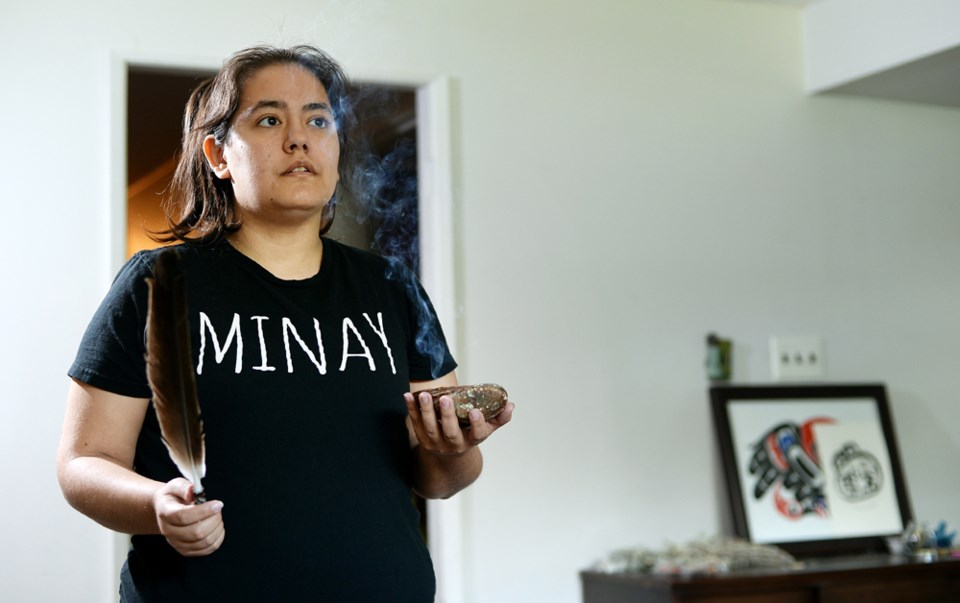A Burnaby woman has filed a complaint with the B.C. Human Rights Tribunal alleging her landlord is denying her the right to smudge.
Crystal Smith of the Tsimshian Haisla First Nation has smudged – the indigenous practice of burning herbs like sage for prayer or cleansing – for about 15 years.
“It’s been on and off because I really had to find my way,” says the mother of two and UBC master’s student.
Smith’s maternal grandparents died before she was born, and as she puts it, she “didn’t grow up in culture.”
“This is something I had to do on my own. Now that I have children, it’s very important to me to pass on these cultures and these spiritual practices so they can grow up and be proud of who they are.”
At the last home she rented, Smith says she had a unit on the top floor and the landlord had no issues with her smudging.
“They understood the spiritual practice, that it was meant to support me, in my growth and in my culture,” she tells the NOW, noting she received her entire damage deposit back when she left.
Smith moved into a duplex, an address she did not want to disclose for privacy reasons, on Jan. 1, 2017, and signed a one-year lease. But her landlord, Parminder Mohan, was not as understanding, she says.
Since January, Smith has been given three eviction notices, including one to end tenancy early and another one for renovation purposes.
“It’s actually really gross. He’s actually trying to say I’m smoking marijuana and that I’m covering it up with the sage,” she says. “I don’t smoke at all. I’m not doing any damage to the place. It produces white smoke, which does no damage to surrounding walls. The smell does dissipate after maybe a couple days.”
Smith adds Mohan promised her she could move from the basement to the upstairs unit on April 1.
“He won’t let me move upstairs unless I sign an agreement saying I won’t smudge,” she says.
Smith took her eviction notices to the Residential Tenancy Branch for dispute resolution. In the first meeting, the arbitrator found there was “insufficient evidence to conclude that the tenant has unreasonably disturbed or adversely affected the other tenants.”
The arbitrator dismissed Mohan’s application for an early end to tenancy.
In the meantime, Smith was referred to the Public Interest Advocacy Centre for free legal counsel.
After hearing her case, lawyers Kate Feeney and Erin Pritchard advised Smith to submit a complaint to the B.C. Human Rights Tribunal.
“From a legal perspective, smudging’s a spiritual practice, so it’s protected under the Human Rights Code. ... The landlord must justify his conduct,” says Feeney.
As far as Feeney knows, Smith’s case is the first of its kind to come before the tribunal.
“There’s been some cases that touch on similar issues in the prison context, like the right for prisoners to smudge, but not in the residential tenancy context,” she says.
When reached for comment, Mohan didn’t shy away from saying why he wants Smith out.
“What she does is she smokes up the whole place. We agreed there was no smoking or anything like that in the unit,” he tells the NOW, reiterating that he thinks Smith is smoking weed.
The first time Mohan realized Smith was smudging, he says he had to “stagger out” of the house.
“I was absolutely going to go unconscious. That’s how much smoke there was. ... All of our air circulates and that’s how unaccommodating she’s trying to be. She doesn’t care. She says, ‘It’s my right,’ but she doesn’t care about anybody else,” says Mohan.
The property owner, who owns both sides of the duplex but lives with his parents down the road, notes he’s a “very, very good, fair landlord,” and has been very accommodating to Smith. He says he put a dishwasher in her two-bedroom suite and reduced her rent from $1,350 to $1,200.
“I thought I was helping her. ... I try to do my best, but when tenants try to take control and be vindictive like this, it’s unacceptable,” says Mohan, adding he’ll likely file a fourth eviction notice. “I have cultural and religious practices as well, and they require a lot of incense and burning things, but we have fans; we make sure that our practices don’t disturb other people.”



